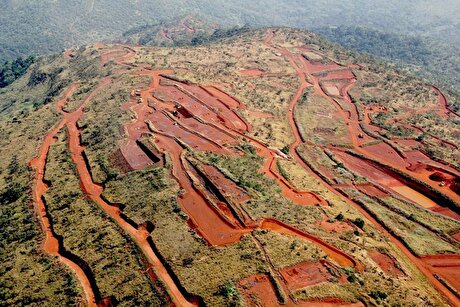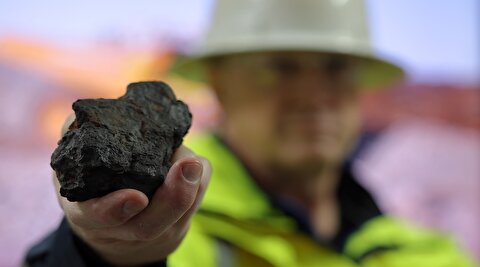
Q&A: Production drops will be sudden: Hamm

You were present at a meeting between oil executives and President Trump last week. How did the meeting go?
The meeting went very well. First of all a lot of thanks given to the president for the action that he had taken. Basically to get a commitment from Russia and the Saudis on production cuts. That I think was universal there at the meeting.
The Domestic Energy Producers Alliance, a group you chair, said it would ask the administration to launch anti-dumping investigation against the Saudis and Russia. What is the latest on that?
First of all it is illegal, unfair to take advantage of the market as had happened by the announcement by the Saudis and their actions following the March 9-10 announcement that they made. So DEPA took the lead.
It became apparent that the best way to get to go about it, since it was a matter of national security, was the government to self-initiate a trade case if the need be. So that is the way we went forward.
We for sure thought and everybody in the Americas thought that the best thing would be for the president to weigh in. We have a relationship with both those countries at the president's level. Obviously, that was the quickest thing to do, for the president himself to weigh in. Basically that is what happened. The president did weigh in, he wants to protect American interests. He weighed in and got the commitment that they would stop.
The industry has had a double whammy: the Covid-19 has taken 30mn b/d of estimated demand away from the industry globally and on top of that the anti-dumping occurred. So, it really got the president's focus and attention. He did everything exactly right to make this stop. So hopefully that commitment from them is good and they shut it down.
Given the drop in demand, will producers run out of storage space?
Everybody is doing the same thing, working with storage. There are four types of storage: we have field storage, and there is commercial storage, and beyond that refiners have product storage. And some people even use barges and ships.
Storage is limited. The DOE is opening up storage that is available with the strategic petroleum reserve, for leasing that storage to private industry. With 30mn b/d going away, the industry is hunkered down during this global pandemic. As we flatten the curve on the pandemic, you will see activity start back up and eventually demand should come back to almost as it has been. As we have seen in China, pretty soon everybody is back up and running. Maybe over a period of three to six months — who knows? But it will be back. There is nothing fundamentally wrong as it was in 2008-09.
In the meantime, you react to the demand that is there. So operators will choke wells back. That's what we call it — you choke wells individually at the well site, and slow production. We do not anticipate lot of problems. Of course, with offshore that is more difficult.
Is the capex cut by US producers, averaging 35-40pc, enough?
Everybody has to shut down across the spectrum, some 30pc. You may take some higher cost stripper wells offline. Across the board, companies will shut down some production, but is this going to be a huge issue? No! Also there is state action that could occur. The Texas Railroad Commission is having a meeting on the 14 thinking about shutting production back in Texas. Oklahoma has pro-rated. The states have that authority.
Those that jumped capex quite a bit, they have made some huge cuts. Our company cut back capex, others probably have to do that two or three times. That's the same with countries or companies around the world —they will have to curb. We have done what we need to do here, and they have to do what they need to do there as well.
With the pullback in spending, how much will production decline?
I think you will see it fall just like it did in 2015. It is going to happen at a faster clip. I think it is going to be more abrupt than it was back then.
People can bring rigs down very quickly, and that is what we are doing in the company. It is going to be very abrupt, with the cutback. The part we need to worry about is having a viable industry that can get going again in the third quarter or fourth quarter of this year. That is going to be test.
Are we going to see more US bankruptcies?
The industry has had a double whammy. And it is not a tremendous amount of debt that is out there, they are a couple of years out. Our first tranche is almost two-and-a-half years out. The industry will be up and running by then. There is also some help that could be available as well with the Federal Reserve to help the industry.
Should US refiners increase processing more shale oil?
The refiners — they did not see the shale oil coming. They totally missed the boat on that. We say: the majors — When the ship came in, they were at the airport. They did not believe in the shales, so they missed the boat.
They retooled these refineries, they wanted to bank on Canadian crude. It cost billions, but they had all this oil available to them under their feet. It also cost billions to move all that product from Canada and move oil by ship over here.
They like to take the worst oil that they can buy cheaply and make products that sell for the best value, for the best money. They think that is in their best interest. I would like to just make sure they look at all the money they wasted on transportation cost, needlessly year after year after year.
By Manash Goswami


Gold price edges up as market awaits Fed minutes, Powell speech

Glencore trader who led ill-fated battery recycling push to exit

Emirates Global Aluminium unit to exit Guinea after mine seized

UBS lifts 2026 gold forecasts on US macro risks

Iron ore price dips on China blast furnace cuts, US trade restrictions

Roshel, Swebor partner to produce ballistic-grade steel in Canada

EverMetal launches US-based critical metals recycling platform

US hikes steel, aluminum tariffs on imported wind turbines, cranes, railcars

Afghanistan says China seeks its participation in Belt and Road Initiative

First Quantum drops plan to sell stakes in Zambia copper mines

Ivanhoe advances Kamoa dewatering plan, plans forecasts

Texas factory gives Chinese copper firm an edge in tariff war

Pan American locks in $2.1B takeover of MAG Silver

Iron ore prices hit one-week high after fatal incident halts Rio Tinto’s Simandou project

US adds copper, potash, silicon in critical minerals list shake-up

Barrick’s Reko Diq in line for $410M ADB backing

Gold price gains 1% as Powell gives dovish signal

Electra converts debt, launches $30M raise to jumpstart stalled cobalt refinery

Gold boom drives rising costs for Aussie producers

First Quantum drops plan to sell stakes in Zambia copper mines

Ivanhoe advances Kamoa dewatering plan, plans forecasts

Texas factory gives Chinese copper firm an edge in tariff war

Pan American locks in $2.1B takeover of MAG Silver

Iron ore prices hit one-week high after fatal incident halts Rio Tinto’s Simandou project

US adds copper, potash, silicon in critical minerals list shake-up

Barrick’s Reko Diq in line for $410M ADB backing

Gold price gains 1% as Powell gives dovish signal

Electra converts debt, launches $30M raise to jumpstart stalled cobalt refinery
















